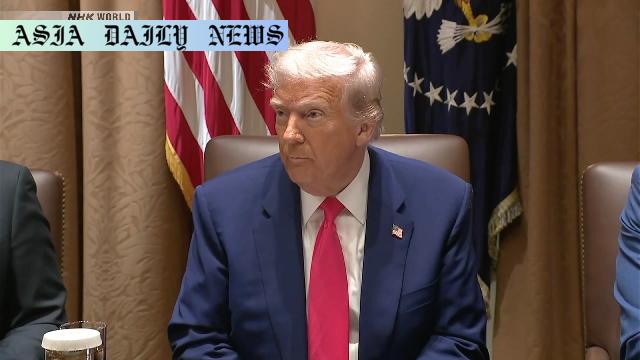Middle East – US President Donald Trump will visit Saudi Arabia, Qatar, and the UAE from May 13 to May 16, focusing on key issues.

President Trump’s Upcoming Middle East Tour
The US President, Donald Trump, is set to embark on an ambitious three-country official visit to the Middle East from May 13 to May 16. This marks a significant step in his second term as president, underlining a proactive approach to diplomacy and strengthening relations in the region. The trip will take him to Saudi Arabia, Qatar, and the United Arab Emirates, where pivotal global and regional issues, including the situations in Ukraine and the Gaza Strip, are expected to dominate discussions.
This visit reflects a continuation of Trump’s foreign policy priorities, as his first overseas visit during his initial term also included Saudi Arabia. The US presidency’s emphasis on maintaining and boosting economic, political, and security alliances in the Middle East is evident. Trump’s interactions with key leaders are aimed at not only addressing current crises but also fostering regional stability and economic growth amid geopolitical shifts.
Prioritizing Economic and Diplomatic Alliances
One of the core objectives of this visit will involve discussions on strengthening economic ties with Saudi Arabia, a country that has long been a pivotal ally of the United States. Under Trump’s administration, the US has emphasized its partnership with Saudi Arabia, hosting several mutual trade and investment initiations. The visit is expected to touch upon enhancing these economic linkages further.
The inclusion of Qatar and the UAE, two other key partners in the Gulf region, also highlights the quest for comprehensive cooperation across critical fronts. Specifically, the discussions will hold additional weight in light of the Ukraine conflict, as regional efforts marked by Saudi Arabia’s involvement in US-led ceasefire talks were instrumental in facilitating global diplomacy efforts. The ceasefire talks have often been characterized as vehicles for showcasing the growing influence and neutrality of Gulf players in an increasingly multipolar world.
Addressing Regional Tensions: Focus on Ukraine, Gaza, and Iran
Trump’s visit will not only strengthen bilateral ties but is also aimed at addressing pressing security concerns. Ukraine, an ongoing flashpoint of geopolitical struggle between Russia and Western nations, remains a focus of discussions anticipated during this tour. Saudi Arabia’s involvement in brokering ceasefire dialogues positions it as a critical partner in these efforts.
Simultaneously, tensions in Gaza are another pressing concern, with US-mediated peace talks between Israel and Hamas facing frequent stalls. These topics remain crucial, particularly given Trump’s direct ownership of Middle Eastern policy during his previous term. Moreover, Trump recently spoke by phone with Israeli Prime Minister Netanyahu, signaling the linkage between his Middle East visit and efforts to stabilize relations involving Israel, Palestine, and Iran.
Engagement with Iran: Nuclear Program and Regional Stability
The Trump administration’s continued dialogues with Iran over its nuclear program play a critical role in the broader Middle Eastern policy discourse. As the United States remains engaged in managing and addressing concerns over Iran’s alleged nuclear ambitions, the issue is expected to resurface prominently in talks across all three nations visited. This is particularly underscored by Trump’s history of hard-line stances on the subject and the shared concerns of Saudi Arabia and its Gulf neighbors.
Beyond nuclear negotiations, Iran’s influence throughout the Middle East on issues such as Yemen’s conflict arena further broadens Trump’s agenda during his time in the region. By reinforcing transnational efforts to ensure stability and tamp down conflict, Trump aims to reaffirm America’s ongoing commitment to countering destabilizing trends in the region.
In conclusion, President Trump’s upcoming trip to the Middle East symbolizes a renewed vow toward regional diplomacy and cooperative partnerships. As discussions unfold in May, the outcomes of his engagements may define future trajectories of both bilateral and multilateral diplomacy in an evolving Arab world.
Commentary
A Timely Diplomatic Endeavor
President Trump’s impending trip to the Middle East underscores the importance of maintaining robust diplomatic relationships in an era fraught with global uncertainties. His itinerary, which includes key Gulf allies such as Saudi Arabia, Qatar, and the UAE, marks not only a reaffirmation of America’s presence in the region but also a calculated move to address critical issues concerning Ukraine, Gaza, and Iran.
Focus on Regional Stability and Cooperation
The inclusion of discussions surrounding Ukraine and Gaza signals the United States’ intent to engage constructively in fostering peace and resolving long-standing conflicts. By leveraging Saudi Arabia’s stature as a regional leader and mediator, the US continues to echo its dedication to advocating peace through dialogue. Gulf cooperation serves as a vital cornerstone in these endeavors, signifying the weight such partnerships hold in furthering mutual goals both economically and politically.
Economic Impact and Broader Implications
However, this visit is about more than conflict resolution. It is also a reminder of the economic imperatives that tie the US and the Gulf states together. From energy security to trade alliances, fostering deeper economic linkages presents opportunities to develop partnerships that transcend political rifts. This strategic foresight amplifies Trump’s intention to position the US as a steadfast partner, willing to engage and collaborate even during tumultuous times globally.
Ultimately, the success of Trump’s Middle East tour will hinge upon how well it bridges immediate tensions with long-term objectives. Whether strengthening economic relations or addressing the critical challenges of regional instability, this diplomatic mission stands as a testament to the enduring importance of active and thoughtful global engagement.


